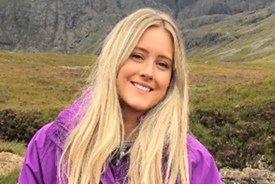
What are your research interests?
My work is based on trying to find natural product antifouling compounds from marine invertebrates to help prevent biofouling of immersed structures in the oil and gas industry. I am interested in marine invertebrates which do not show fouling on their outer surfaces, the chemical defence compounds they produce and how these compounds could be used to prevent biofouling in the maritime industries.
How did you first get involved with SCI?
I first got involved with SCI after I was made one of the winners of the Scotland Group Essay competition where I wrote an article explaining how my research connects with industry. Since then I’ve been in touch with various people within SCI and decided to become an ambassador after learning more about the organisation and realising what a great community it is. Being a member of SCI has opened the doors to networking opportunities and has allowed my work to be communicated to the wider community which I am really grateful for!
What do you hope to gain from your involvement with SCI?
Through my involvement with SCI, I hope to be able to meet new people from different universities, and within industry, to find out what research is going on and to hopefully make some good contacts for my future. It would also be great to be able to improve my science communication skills and to get the opportunity to spread the news about what’s going on at the moment in the scientific community.
SCI aims to be ‘where science meets business’. What is the potential commercial application of your research?
My research is based on trying to find a natural product solution to biofouling of oil and gas structures. In the oil and gas industry, thousands of tonnes of marine fouling can build up on subsea structures making them very costly to remove come the time of decommissioning. There are solutions out there already to help tackle marine fouling, however, a lot of these are toxic to marine life. My project aims to find an environmentally friendly alternative by studying the compounds produced by marine creatures and using these as inspiration for creating a new antifouling product to prevent marine fouling.
Jessica Gomez-Banderas
The National Decommissioning Centre at the University of Aberdeen, Department of Chemistry
External Links

